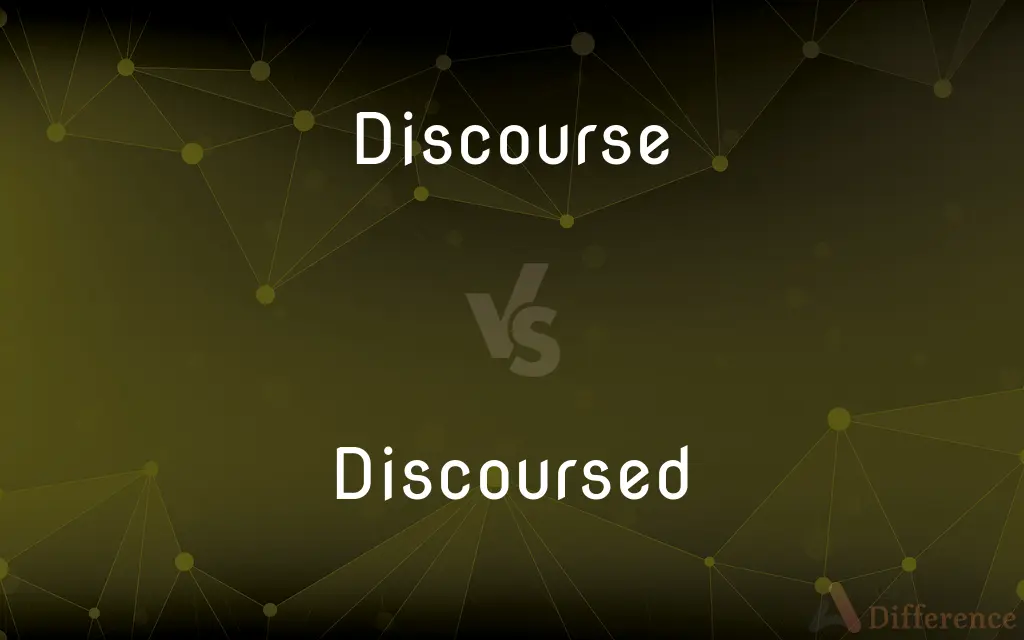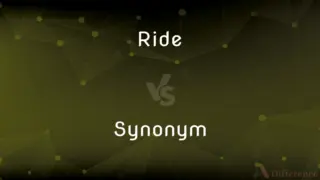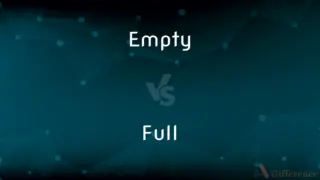Discourse vs. Discoursed — What's the Difference?

Difference Between Discourse and Discoursed
ADVERTISEMENT
Compare with Definitions
Discourse
Discourse is a generalization of the notion of a conversation to any form of communication. Discourse is a major topic in social theory, with work spanning fields such as sociology, anthropology, continental philosophy, and discourse analysis.
Discoursed
Verbal expression in speech or writing
Political discourse.
Discourse
Verbal expression in speech or writing
Political discourse.
Discoursed
Verbal exchange or conversation
Listened to their discourse on foreign policy.
Discourse
Verbal exchange or conversation
Listened to their discourse on foreign policy.
ADVERTISEMENT
Discoursed
A series of connected remarks about a subject.
Discourse
A series of connected remarks about a subject.
Discoursed
A formal, lengthy treatment of a subject, either written or spoken.
Discourse
A formal, lengthy treatment of a subject, either written or spoken.
Discoursed
(Archaic) The process or power of reasoning.
Discourse
(Archaic) The process or power of reasoning.
Discoursed
To speak or write formally and at length.
Discourse
To speak or write formally and at length.
Discoursed
To engage in conversation or discussion; converse
“The two men walked around the city and discoursed on its antiquities” (Michael Wood).
Discourse
To engage in conversation or discussion; converse
“The two men walked around the city and discoursed on its antiquities” (Michael Wood).
Discoursed
To narrate or discuss.
Discourse
To narrate or discuss.
Discoursed
Simple past tense and past participle of discourse
Discourse
Verbal exchange, conversation.
Discourse
(uncountable) Expression in words, either speech or writing.
Discourse
(countable) A formal lengthy exposition of some subject, either spoken or written.
The preacher gave us a long discourse on duty.
Discourse
(countable) Any rational expression, reason.
Discourse
An institutionalized way of thinking, a social boundary defining what can be said about a specific topic (after Michel Foucault).
Discourse
(obsolete) Dealing; transaction.
Discourse
(intransitive) To engage in discussion or conversation; to converse.
Discourse
(intransitive) To write or speak formally and at length.
Discourse
To debate.
Discourse
To exercise reason; to employ the mind in judging and inferring; to reason.
Discourse
To produce or emit (musical sounds).
Discourse
The power of the mind to reason or infer by running, as it were, from one fact or reason to another, and deriving a conclusion; an exercise or act of this power; reasoning; range of reasoning faculty.
Difficult, strange, and harsh to the discourses of natural reason.
Sure he that made us with such large discourse,Looking before and after, gave us notThat capability and godlike reasonTo fust in us unused.
Discourse
Conversation; talk.
In their discourses after supper.
Filling the head with variety of thoughts, and the mouth with copious discourse.
Discourse
The art and manner of speaking and conversing.
Of excellent breeding, admirable discourse.
Discourse
Consecutive speech, either written or unwritten, on a given line of thought; speech; treatise; dissertation; sermon, etc.; as, the preacher gave us a long discourse on duty.
Discourse
Dealing; transaction.
Good Captain Bessus, tell us the discourseBetwixt Tigranes and our king, and howWe got the victory.
Discourse
To exercise reason; to employ the mind in judging and inferring; to reason.
Discourse
To express one's self in oral discourse; to expose one's views; to talk in a continuous or formal manner; to hold forth; to speak; to converse.
Bid me discourse, I will enchant thine ear.
Discourse
To relate something; to tell.
Discourse
To treat of something in writing and formally.
Discourse
To treat of; to expose or set forth in language.
The life of William Tyndale . . . is sufficiently and at large discoursed in the book.
Discourse
To utter or give forth; to speak.
It will discourse most eloquent music.
Discourse
To talk to; to confer with.
I have spoken to my brother, who is the patron, to discourse the minister about it.
Discourse
Extended verbal expression in speech or writing
Discourse
An address of a religious nature (usually delivered during a church service)
Discourse
An extended communication (often interactive) dealing with some particular topic;
The book contains an excellent discussion of modal logic
His treatment of the race question is badly biased
Discourse
To consider or examine in speech or writing;
The article covered all the different aspects of this question
The class discussed Dante's `Inferno'
Discourse
Carry on a conversation
Discourse
Talk or hold forth formally about a topic;
The speaker dissertated about the social politics in 18th century England
Share Your Discovery

Previous Comparison
Ride vs. Synonym
Next Comparison
Empty vs. Full













































